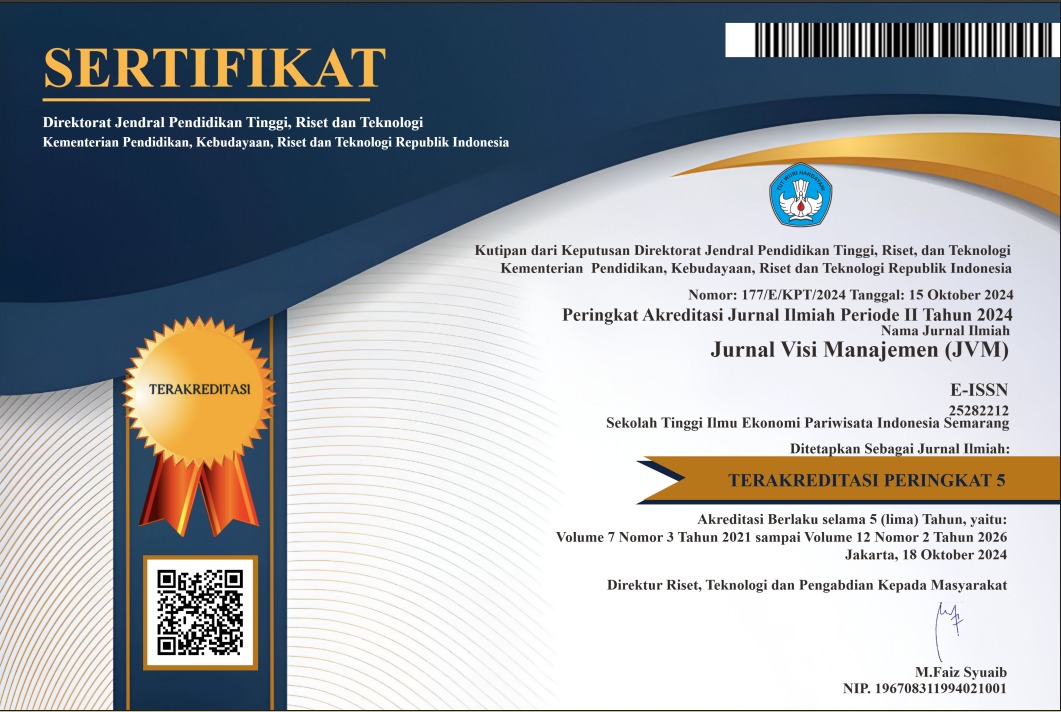Brand Image Impact on Maritime Service Quality: Stakeholder Perspectives in Indonesian Shipping
DOI:
https://doi.org/10.56910/jvm.v11i3.819Keywords:
Indonesian shipping industry, Maritime Brand Management, Maritime Vocational Education, Service Quality Enhancement, Stakeholder Perspective Analysis, Sustainable ShippingAbstract
This research employs a qualitative approach to investigate how corporate brand image shapes the quality of maritime services, using a comprehensive stakeholder perspective within the Indonesian shipping industry. The study adopts PT. Multi Jaya Samudra’s TB. Maiden Central operations as its focal case, gathering insights from maritime professionals, academic experts, and industry practitioners to better understand the interconnection between brand perception and service delivery. Data were collected through semi-structured interviews with 65 participants, followed by a thematic analysis to identify emerging patterns. The results highlight that corporate brand image plays a substantial role in influencing how service quality is perceived, with a positive correlation of 79.8% found between brand strength and customer satisfaction. Key themes emerging from the analysis include the enhancement of professional trust, the incorporation of educational elements into industry practices, and the promotion of operational excellence. A robust and reputable brand is shown to provide shipping companies with a distinct competitive edge, while also aligning with broader objectives such as sustainable maritime growth and the adoption of digital innovation. Beyond practical business value, the research enriches the field of maritime business management by presenting a stakeholder-driven framework for brand development, offering opportunities for the integration of industry-relevant curricula in maritime vocational education, and promoting sustainable transportation practices. These findings yield actionable implications for Indonesian shipping enterprises that aim to strengthen brand positioning, improve service performance, and remain competitive in an increasingly dynamic and environmentally conscious maritime sector.
References
Al-Mamun, M. A., Liu, Q., Chowdhury, S. R., Uddin, M. S., Nazrul, K. M. S., & Sultana, R. (2021). Stock assessment for seven fish species using the LBB method from the northeastern tip of the Bay of Bengal, Bangladesh. Sustainability, 13(3), 1561. https://doi.org/10.3390/su13031561
Bilal, A., Xiao-ping, L., Nanli, Z., Sharma, R., & Jahanger, A. (2021). Green technology innovation, globalization, and CO₂ emissions: Recent insights from the OBOR economies. Sustainability, 14(1), 236. https://doi.org/10.3390/su14010236
Caldas, P., Pedro, M. I., & Marques, R. C. (2024). An assessment of container seaport efficiency determinants. Sustainability, 16(11), 4427. https://doi.org/10.3390/su16114427
Caldeirinha, V., Felício, J. A., Pinho, T., & Rodrigues, R. (2024). Fuzzy-set QCA on performance and sustainability determinants of ports supporting floating offshore wind farms. Sustainability, 16(7), 2947. https://doi.org/10.3390/su16072947
Chae, G.-Y., An, S.-H., & Lee, C.-Y. (2021). Demand forecasting for liquified natural gas bunkering by country and region using meta-analysis and artificial intelligence. Sustainability, 13(16), 9058. https://doi.org/10.3390/su13169058
Du, S., Zhang, H. S., & Kong, Y. (2023). Sustainability implications of the Arctic shipping route for Shanghai port logistics in the post-pandemic era. Sustainability, 15(22), 16017. https://doi.org/10.3390/su152216017
Hilmi, N., Farahmand, S., Lam, V. W. Y., Cinar, M., Safa, A., & Gilloteaux, J. (2021). The impacts of environmental and socio-economic risks on the fisheries in the Mediterranean region. Sustainability, 13(19), 10670. https://doi.org/10.3390/su131910670
Jian-ping, S., Fang, C., Chen, Z., & Chen, G. (2021). Regional cooperation in marine plastic waste cleanup in the South China Sea region. Sustainability, 13(16), 9221. https://doi.org/10.3390/su13169221
Kim, B., Kim, G., & Kang, M.-H. (2022). Study on comparing the performance of fully automated container terminals during the COVID-19 pandemic. Sustainability, 14(15), 9415. https://doi.org/10.3390/su14159415
Kim, S.-K., Choi, S., & Kim, C. (2021). The framework for measuring port resilience in Korean port case. Sustainability, 13(21), 11883. https://doi.org/10.3390/su132111883
Liao, Y.-H., & Lee, H.-S. (2023). Using a directional distance function to measure the environmental efficiency of international liner shipping companies and assess regulatory impact. Sustainability, 15(4), 3821. https://doi.org/10.3390/su15043821
Mwendapole, M. J., & Jin, Z. (2021). Evaluation of seaport service quality in Tanzania: From the Dar Es Salaam seaport perspective. Sustainability, 13(18), 10076. https://doi.org/10.3390/su131810076
Paridaens, H., & Notteboom, T. (2021). National integrated maritime policies (IMP): Vision formulation, regional embeddedness, and institutional attributes for effective policy integration. Sustainability, 13(17), 9557. https://doi.org/10.3390/su13179557
Pian, F., Xu, L., Chen, Y., & Lee, S.-H. (2020). Global emission taxes and port privatization policies under international competition. Sustainability, 12(16), 6595. https://doi.org/10.3390/su12166595
Qi, J., Wang, S., & Zheng, J. (2022). Shore power deployment problem—A case study of a Chinese container shipping network. Sustainability, 14(11), 6928. https://doi.org/10.3390/su14116928
Sunny, A. R., Mithun, M. H., Prodhan, S. H., Ashrafuzzaman, M., Rahman, S. M. A., Billah, M. M., Hussain, M., Ahmed, K. J., Sazzad, S. A., Alam, M. T., Rashid, A., & Hossain, M. M. (2021). Fisheries in the context of attaining sustainable development goals (SDGs) in Bangladesh: COVID-19 impacts and future prospects. Sustainability, 13(17), 9912. https://doi.org/10.3390/su13179912
Zhang, W., Zhang, Y., & Qiao, W. (2022). Risk scenario evaluation for intelligent ships by mapping hierarchical holographic modeling into risk filtering, ranking and management. Sustainability, 14(4), 2103. https://doi.org/10.3390/su14042103
Zhou, K., Yuan, X., Guo, Z., Wu, J., & Li, R. (2024). Research on sustainable port: Evaluation of green port policies on China's coasts. Sustainability, 16(10), 4017. https://doi.org/10.3390/su16104017
Zhu, J., Yan, W., He, J., Hafeez, M., & Sohail, S. (2024). RETRACTED: Exploring the convergence of ICT, digital financial inclusion, environmental pressures, and free trade and their significance in driving sustainable green investment initiatives under carbon neutrality targets. Heliyon, 10(11), e31102. https://doi.org/10.1016/j.heliyon.2024.e31102
Downloads
Published
How to Cite
Issue
Section
License
Copyright (c) 2025 Jurnal Visi Manajemen

This work is licensed under a Creative Commons Attribution-ShareAlike 4.0 International License.







